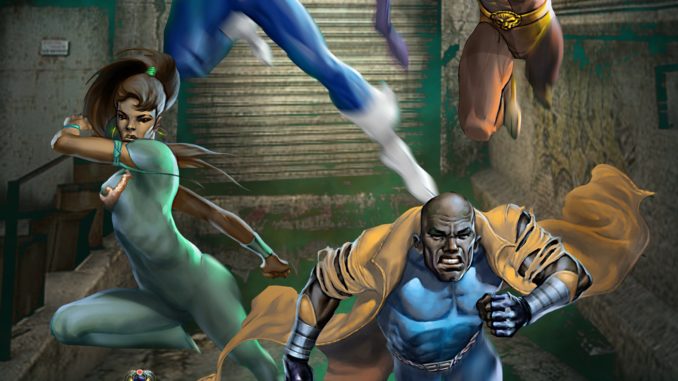
A caped vigilante ends up dead in the midst of chasing a group of robbers and that’s before you barely get into the pages of ‘Streetz.’ Issue one shows that a drug is effecting heroes and the criminal element alike. It also reveals that just because you wear a cape doesn’t mean you’re a good guy. Take the one who died on the job. All full of bravado, he’s barely an afterthought being scraped off the pavement before you realize he had a family. What does his death do to them? Then there’s the heroes who you don’t realize you’ve hired until they tell you to cut them a check. They’re as much a plague on the people and neighborhoods they claim to protect as the drug dealers and killers. This is the type of the world where there’s a microscopic line between justice and just-us.
The artwork is as strikingly on point as the interconnected narrative. You can feel the claustrophobic atmosphere, particularly in the club scene. It heightens the tension between partners Crest and Ace’s already strained alliance. Writer Tony Kittrell et al have taken several tropes of mainstream comics by using them to uncover the pragmatism of being a superhero. Unlike Luke Cage’s ‘Hero for Hire’ who took questionable assignments, yet still kept his good guy status by working with Captain America and the Avengers, the super-beings in ‘Streetz’ make questionable choices without a conscious. The criminals are just as dark. There are no good guys here, no one wants to be redeemed. Even the costumed guy who wants to clean up the drugs, bursts in with a lot of bravado and moralizing when, he could have gotten answers if he’d trusted his partner from the beginning. There’s a considerable amount to unpack in this comic and it’s only issue one.
Reading this comic book will also show you that there are alternatives out there. DC and Marvel may have flagship titles and mainstream characters, still, they tend to get stale and may fall into the same superhero clichés. Whereas comics like ‘Streetz’ aren’t tied to the legacy of say Ironman. You can get a refreshing take on perhaps the original intention of what this genre can do. Also, consider as you’re reading this comic, if you notice there aren’t stereotypes. Cookie-cutter characters who are supposed to behave in a certain way because they don’t operate within the means of the law or are on the fringe of society don’t act the way you’d expect them to. Instead, you’re introduced to groups who are struggling to survive.
Something definitely special is happening in this comic and you’ll look forward to seeing how this is all going to play out.

Leave a Reply